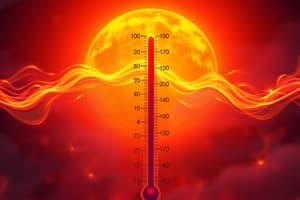Podcast
Questions and Answers
Match the following physics concepts with their definitions:
Match the following physics concepts with their definitions:
Conduction = Transfer of heat through a material without any flow of the material itself Convection = Transfer of heat through the movement of a fluid or gas Radiation = Transfer of heat through electromagnetic waves Insulation = Material used to reduce the transfer of heat
Match the following heat transfer methods with their examples:
Match the following heat transfer methods with their examples:
Conduction = Heating a metal rod at one end and feeling the other end become warm Convection = Feeling the warmth of a campfire from a distance Radiation = Feeling the warmth of the sun on a sunny day Insulation = Using a thermos to keep a drink hot or cold for a long time
What is the specific heat capacity of a substance and how does it affect its ability to store heat?
What is the specific heat capacity of a substance and how does it affect its ability to store heat?
Specific heat capacity is the amount of heat energy required to raise the temperature of 1 kg of a substance by 1 degree Celsius. It determines how effectively a substance can store heat.
Match the following heat-related terms with their units of measurement:
Match the following heat-related terms with their units of measurement:
Explain the concept of conduction, convection, and radiation with respect to heat transfer.
Explain the concept of conduction, convection, and radiation with respect to heat transfer.
How does the greenhouse effect contribute to global warming, and what are the potential consequences?
How does the greenhouse effect contribute to global warming, and what are the potential consequences?
Flashcards are hidden until you start studying




